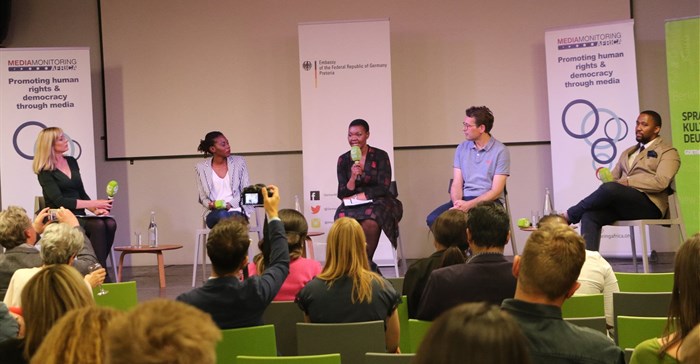Media funding is not only about finance; it is about media freedom. This makes the current problems around funding in journalism a crisis.

The panel was moderated by Francis Herd. The panellists included Carol Mohlala, Phatiswa Magopeni, Philip Schworbel and Siyabonga Africa. © Goethe-Institut South Africa. Taken by Judit Hoffkamp.
This was the topic of the second in the Future of Journalism Series held at the Goethe-Institut and hosted together with Embassy of the Federal Republic of Germany and Media Monitoring Africa.
The topic was discussed by a panel facilitated by Francis Herd (SABC) facilitator. The panellists included Philip Schworbel - Krairepoter/Steady, Germany, Phathiswa Magopeni – head of news, SABC, Siyabonga Africa - program officer, SA Media Innovation Program, and Carol Mohlala – executive director, Association for Independent Publishers.
Funding is a massive problem for print media, says Schworbel. “This is further aggravated by the fact that the online model is not working, making it a crisis of deep proportions. The impact is that as newspapers close, people are losing their jobs and some regions are in a news desert.”
Schworbel says clickbait is a good example of just how deep this crisis runs as it makes for bad quality journalism. “Modern journalism requires people to pay and we are seeing this in the subscription models used by some big news brands such as the Washington Post. If you want quality journalism, you will have to pay for it.”
To make this type of journalism happen, newspapers must build a relationship of trust with their readers.
Newspapers cannot consider readers as consumers anymore but as eye-to-eye partners.
The other model is a voluntary contribution or donation model. “While this is based on purpose and passion, the problem is that a donation is a once-off and not very sustainable. The membership model is a combination of this and subscriptions.”
Diversified revenue model
Siyabonga Africa of the SA Media Innovation Program agrees this him adding: “We need sustainable business models. While there has been a proliferation of platforms – video, podcasts, crowdfunding, donations, memberships etc. - no one is sure which one will work. Everyone is looking for the magic formula.”
He believes the solution is a mixture of a few solutions. “A diversified revenue model, not one revenue stream, is the best option.”
A conversation about the finance of journalism has included the crisis in journalism itself if it is to be solved. “Journalists need to redefine their role from not only presenting the truth but having an eye-to-eye conversation with their readers. This is the goal. Journalists are more and more conversation leaders and not storytellers,” says Schworbel.
This he adds is where the legacy of the traditional media model is most challenging. We are so accustomed to broadcasting with very little interaction.
Magopeni adds that we leave audiences to talk on our social platforms, but we are not there. “We leave them there, yet we have created this platform for a community to converge. We need to stop dumping content and instead engage and moderate it.”
This goes hand in hand with producing content for people in their home language. Mohlala says:
There is a huge market for local journalism. People want to tell their stories and in their language.
Revenue constraintsThe panel also addressed the SABC as a public broadcaster and its funding issues. “Having funding issues affects the skills you can curate to produce content. We cannot deliver because of revenue constraints,” says Magopeni. A public broadcaster cannot take up any of the funding solutions talked about such as membership or a paywall, precisely because it is a public broadcaster. “We need to find other revenue models while working with what we currently have and elevating some of these. However, we must guard against outside interference.”
She adds that the broadcaster needs to get to the point where all South Africans feel the broadcaster belongs to them. Africa adds to this. “The broadcaster belongs to all, but we do not feel like it does. We pay a licence, but the audience engagement is missing.”



















































